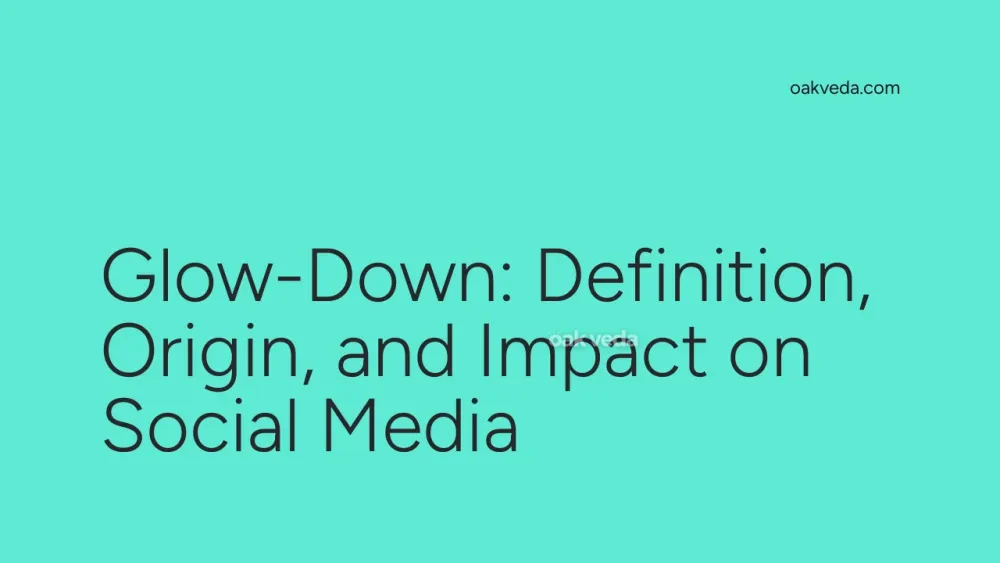
What is Glow-Down?
A "glow-down" is a social media term that refers to a perceived decline in someone's physical appearance or overall attractiveness over time. It's essentially the opposite of a "glow-up," which describes a positive transformation in one's looks or confidence. The term is often used humorously or lightheartedly to acknowledge that everyone experiences fluctuations in their appearance and self-presentation.
Origin and Development of Glow-Down
The term "glow-down" emerged as a playful counterpart to the popular phrase "glow-up." While the exact origin is difficult to pinpoint, it gained traction on social media platforms around 2015. The term first appeared on Urban Dictionary that year and quickly spread to Twitter, TikTok, and YouTube.
"Glow-down" has its roots in African American Vernacular English (AAVE), much like its predecessor "glow-up." As social media users embraced the concept of sharing their personal transformations, the idea of a "glow-down" naturally evolved to describe less flattering changes.
How Glow-Down Works
In practice, a glow-down is often illustrated through before-and-after comparisons. Users might share photos or videos of themselves from a time when they felt they looked their best, juxtaposed with current images where they perceive themselves as less attractive. This trend has become particularly popular on platforms like TikTok and Instagram, where visual content reigns supreme.
It's important to note that the concept of a glow-down is subjective and can be influenced by various factors, including:
- Changes in personal style
- Fluctuations in weight or fitness levels
- Alterations in grooming habits
- Life circumstances affecting one's overall well-being
Popular Examples of Glow-Down
Celebrities and influencers are often the subjects of glow-down discussions. Fans and followers might compare current photos to earlier images, sparking debates about whether a public figure has experienced a glow-down. However, it's crucial to approach these comparisons with sensitivity, as they can perpetuate harmful beauty standards and negatively impact mental health.
Some notable examples of glow-down discussions in popular culture include:
- Child actors transitioning to adulthood
- Musicians changing their image between album cycles
- Reality TV stars before and after their rise to fame
Impact of Glow-Down on Social Media Culture
The glow-down phenomenon has had several effects on social media culture:
-
Increased body awareness: While not always positive, the term has contributed to greater discussions about body image and self-perception.
-
Authenticity movement: Some users embrace their "glow-downs" as a way to promote authenticity and challenge unrealistic beauty standards.
-
Mental health concerns: The focus on appearance changes can exacerbate issues related to self-esteem and body dysmorphia.
-
Humor and relatability: Many people use the concept of glow-downs to connect with others through shared experiences and self-deprecating humor.
Controversies Surrounding Glow-Down
The term "glow-down" has sparked debates within the social media community:
- Body shaming: Critics argue that the concept promotes judgment based on appearance and can be a form of subtle body shaming.
- Ageism: Discussions of glow-downs often overlook the natural aging process, potentially reinforcing ageist attitudes.
- Mental health impact: Constant comparison and focus on physical appearance can negatively affect users' mental well-being.
How Brands and Influencers Use Glow-Down
Despite its potential controversies, some brands and influencers have found ways to incorporate the glow-down concept into their marketing strategies:
- Before-and-after campaigns: Beauty and fitness brands might showcase "reverse" before-and-after images to highlight the effectiveness of their products.
- Authenticity marketing: Influencers sometimes share their own perceived glow-downs to appear more relatable and genuine to their followers.
- Transformation challenges: Some social media challenges involve users showcasing their "glow-downs" before revealing dramatic makeovers.
Future Trends Related to Glow-Down
As social media continues to evolve, so too will the concept of glow-downs:
-
Increased focus on mental health: There may be a shift towards discussing internal "glow-downs" related to mental and emotional well-being.
-
AI and filters: As AI-powered filters become more sophisticated, discussions around "digital glow-downs" when removing these enhancements may increase.
-
Body positivity integration: The body positivity movement might reclaim the term to celebrate all types of physical changes and appearances.
-
Expanded definition: The concept of a glow-down may broaden to encompass various aspects of life beyond just physical appearance.
FAQs about Glow-Down
Q: Is a glow-down always permanent? A: No, a glow-down can be temporary. Many factors influencing appearance can change over time.
Q: How can I avoid a glow-down? A: Focus on overall well-being rather than appearance. Maintain a healthy lifestyle, practice self-care, and remember that everyone's appearance naturally changes over time.
Q: Are glow-downs real or just a social media trend? A: While the term is a social media trend, the concept of changes in appearance over time is real. However, the perception of a "glow-down" is subjective and often exaggerated online.
Q: Can a glow-down be positive? A: Some people view their "glow-downs" positively, seeing them as a reflection of personal growth, changing priorities, or a shift away from societal beauty standards.
In conclusion, the term "glow-down" has become a significant part of social media vernacular, reflecting our culture's complex relationship with appearance and self-image. While it can be used humorously, it's important to approach the concept with awareness of its potential impact on mental health and body image. As social media continues to shape our perceptions, understanding terms like "glow-down" helps us navigate online spaces more consciously and compassionately.
You may be interested in:
- Creator Marketplaces: Definition, Origin, and Impact
- Vibe Check: Definition, Origin, and Impact on Social Media
- Camp in Social Media: Definition, Origin, and Impact
- Bestie: Definition, Origin, and Impact on Social Media
- SEO: Definition, Origin, and Impact on Digital Marketing
- Spamming on Social Media: Definition, Origin, and Impact

